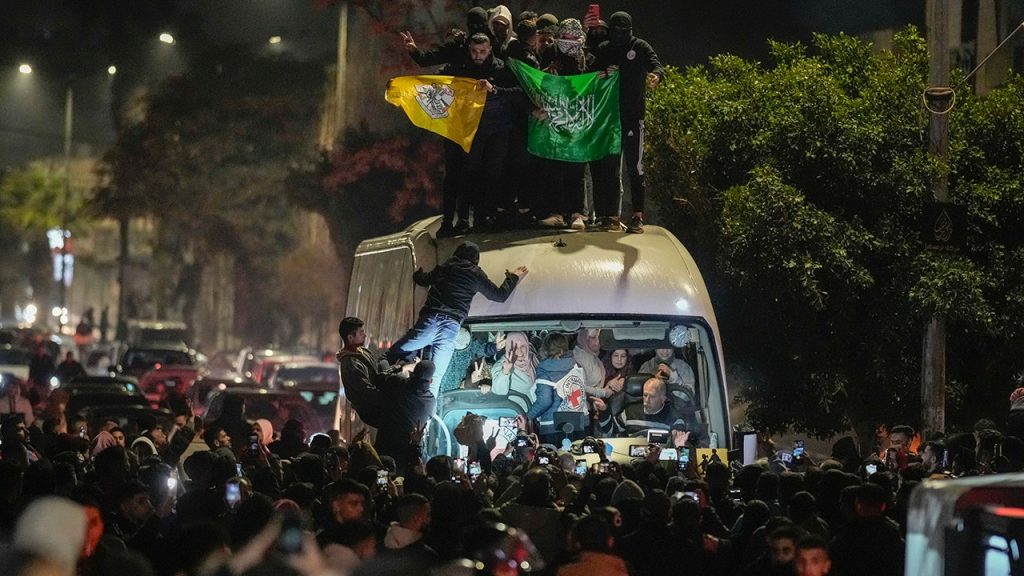The recent release of 90 Palestinian prisoners, primarily women and teenagers, from Israel’s Ofer prison near Ramallah has ignited a mix of jubilation and reflection within the Palestinian community. While the release was met with cheering crowds and celebrations, the backdrop of ongoing conflict and the memory of lost lives tempered the joy. The freed detainees, some having spent months, even years, incarcerated under administrative detention – a practice allowing for indefinite imprisonment without formal charges – spoke of their relief while acknowledging the suffering still endured by Palestinians in Gaza and elsewhere. This release is part of a larger exchange brokered between Israel and Hamas, involving the gradual return of 33 Israeli hostages held in Gaza for over a year.
The release of Palestinian prisoners is a complex issue, often intertwined with political maneuvering and the broader Israeli-Palestinian conflict. Israel justifies its detention policies by citing security concerns, arguing that many of those held are involved in activities that threaten the safety of its citizens. However, human rights organizations criticize the practice of administrative detention, arguing that it violates international law by denying individuals due process and the right to a fair trial. They contend that many detainees are held for extended periods without clear evidence or legal justification, raising concerns about arbitrary detention and the suppression of political dissent. The case of Khalida Jarrar, a prominent Palestinian political leader released in this exchange, exemplifies this debate. While Israel considers her a member of a designated terrorist organization, human rights groups have questioned her arrests, viewing them as part of a broader crackdown on non-violent political opposition.
The simultaneous return of three Israeli hostages from Hamas captivity in Gaza adds another layer of complexity to the prisoner exchange. The hostages, all young women, were held by Hamas for over a year, enduring an ordeal that undoubtedly left a lasting impact. Their release was met with relief and joy in Israel, highlighting the human cost of the ongoing conflict. The hostages were immediately taken to a medical center to undergo evaluations and treatment, underscoring the physical and psychological toll of their captivity. The exchange underscores the delicate balance between humanitarian concerns and political considerations that often characterize such negotiations.
The broader context of this prisoner exchange is the enduring conflict between Israel and Hamas, marked by periods of intense violence interspersed with fragile ceasefires. Hamas, designated as a terrorist organization by many countries, controls the Gaza Strip, a densely populated territory facing significant economic and humanitarian challenges. The blockade imposed by Israel, along with restrictions on movement and access to essential goods, has contributed to the suffering of the Palestinian population in Gaza. The ongoing conflict has resulted in numerous casualties on both sides, fueling cycles of violence and mistrust.
This prisoner exchange is part of a larger ceasefire agreement aimed at de-escalating tensions and creating a path towards a more sustainable peace. The agreement calls for the gradual release of all Israeli hostages held in Gaza in exchange for the release of nearly 2,000 Palestinian prisoners and detainees held by Israel. The implementation of this agreement is fraught with challenges, given the deep-seated mistrust and opposing agendas of the parties involved. The success of the ceasefire and the sustainability of any progress towards peace will depend on the commitment of both sides to uphold the terms of the agreement and engage in meaningful dialogue.
The exchange of prisoners, while a positive step towards easing tensions, also highlights the deep divisions and unresolved issues at the heart of the Israeli-Palestinian conflict. The celebrations surrounding the release of Palestinian prisoners are juxtaposed with the ongoing suffering and uncertainty faced by many Palestinians in Gaza and the West Bank. Similarly, the joy of the returned Israeli hostages is tempered by the memory of lives lost and the enduring challenges to achieving a lasting peace. The road ahead remains uncertain, but the prisoner exchange offers a glimmer of hope for a future where dialogue and understanding can prevail over violence and conflict.


